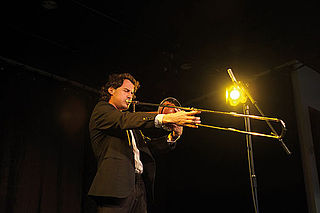This page is based on this
Wikipedia article Text is available under the
CC BY-SA 4.0 license; additional terms may apply.
Images, videos and audio are available under their respective licenses.

East Berlin was the de facto capital city of the German Democratic Republic from 1949 to 1990. Formally, it was the Soviet sector of Berlin, established in 1945. The American, British, and French sectors were known as West Berlin. From 13 August 1961 until 9 November 1989, East Berlin was separated from West Berlin by the Berlin Wall. The Western Allied powers did not recognise East Berlin as the GDR's capital, nor the GDR's authority to govern East Berlin.

"Ich bin ein Berliner" is a quotation of U.S. President John F. Kennedy, in a speech given on June 26, 1963, in West Berlin. It is widely regarded as the best-known speech of the Cold War and the most famous anti-communist speech. Kennedy aimed to underline the support of the United States for West Germany 22 months after Soviet-occupied East Germany erected the Berlin Wall to prevent mass emigration to the West. The message was aimed as much at the Soviets as it was at Berliners and was a clear statement of U.S. policy in the wake of the construction of the Berlin Wall. Another phrase in the speech was also spoken in German, "Lasst sie nach Berlin kommen", addressed at those who claimed "we can work with the Communists", a remark at which Nikita Khrushchev scoffed only days later.

West Berlin was a political enclave which comprised the western part of Berlin during the years of the Cold War. There was no specific date on which the sectors of Berlin occupied by the Western Allies became "West Berlin", but 1949 is widely accepted as the year in which the name was adopted. West Berlin aligned itself politically with the Federal Republic of Germany and was directly or indirectly represented in its federal institutions.

The Berliner Zeitung is a daily newspaper based in Berlin, Germany. It was founded in East Germany in 1945 and continued publication after reunification.
The Berliner Rundfunk (BERU) was a radio station set in East Germany. It had a political focus and discussed events in East Berlin. Today it is a commercial radio station broadcast with the name "Berliner Rundfunk 91.4".

The Berliner Verkehrsbetriebe is the main public transport company of Berlin, the capital city of Germany. It manages the city's U-Bahn underground railway, tram, bus, replacement services (EV) and ferry networks, but not the S-Bahn urban rail system.

Abraham Ernst Mendelssohn Bartholdy was a German banker and philanthropist. He was the father of Felix Mendelssohn, Rebecka Mendelssohn, Paul Mendelssohn and Fanny Mendelssohn.
The Konzerthausorchester Berlin is one of Berlin’s major symphony orchestras.

JazzFest Berlin is a jazz festival in Berlin, Germany. Originally called the "Berliner Jazztage", it was founded in 1964 in West Berlin by the Berliner Festspiele. Venues included Berliner Philharmonie, Haus der Kulturen der Welt, Volksbühne, Haus der Berliner Festspiele and the Jazzclubs Quasimodo and A-Trane.
The Berlin Missionary Society (BMS) or Society for the Advancement of evangelistic Missions amongst the Heathen was a German Protestant Christian missionary society that was constituted on 29 February 1824 by a group of pious laymen from the Prussian nobility.

Since the 18th century Berlin has been an influential musical center in Germany and Europe. First as an important trading city in the Hanseatic League, then as the capital of the electorate of Brandenburg and the Prussian Kingdom, later on as one of the biggest cities in Germany it fostered an influential music culture that remains vital until today. Berlin can be regarded as the breeding ground for the powerful choir movement that played such an important role in the broad socialization of music in Germany during the 19th century.
Berliner Symphoniker is a Symphony orchestra in Berlin, Germany.
The orchestra began its performing activity on 1 September 1967 as Symphonisches Orchester Berlin. In 1990 it was renamed Berliner Symphoniker. Its chief conductor since 1997 has been Lior Shambadal.
Yekaterina Chemberdzhi, also Katia Tchemberdji (nickname) or Jekaterina Wladimirowna Tschemberdschi, is a Russian pianist and composer.
Music archaeology is an interdisciplinary study field that combines musicology and archaeology. As it includes music from numerous cultures, it is often seen as being a part of ethnomusicology, and indeed a study group looking into music archaeology first emerged from ethnomusicological group the ICTM, not from within archaeology.
Neue Berliner Musikzeitung was a musical periodical that appeared in the years 1847-1896 and was published by Bote & Bock. It was a continuation of the Berlin musical newspaper published between 1844-1847 by Karl Gaillard.
Berliner Liedertafel, as the name for a male-voice choir, was first used in December 1808 by Carl Friedrich Zelter, who established the first north German prototype for such male-voice choirs. In 1819 another society was founded by Ludwig Berger, Bernhard Klein, Gustav Reichardt and Ludwig Rellstab and In 1884, Adolf Zander founded the still active men's singing club Berliner Liedertafel e.V.
Therese Schnabel was a German contralto. She was best known for her interpretations of Lieder. She married pianist Artur Schnabel in 1905.








